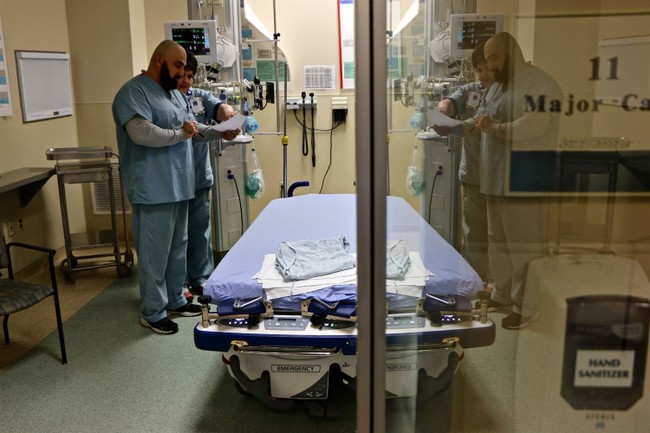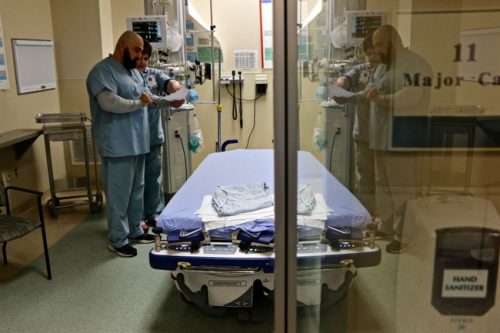The U.S. Conference of Catholic Bishops has enacted a nationwide prohibition on gender-affirming medical interventions inside Catholic hospitals and clinics, a move that changes policy for institutions that serve a large portion of patients across many communities.
The decision lands after years of internal debate and comes with clear backing from bishops who want Catholic health care to follow traditional moral teachings. Many conservatives see this as a necessary defense of medical standards tied to biological sex and the church’s mission to protect human dignity. The directive will affect hospitals that in some places are the only option available for care.
U.S. Catholic bishops voted Wednesday to make official a ban on gender-affirming care for transgender patients at Catholic hospitals. The step formalizes a yearslong process for the U.S. church to address transgender health care.
🚨 BREAKING: The U.S. Conference of Catholic Bishops has officially voted to ban gender-transition procedures, including surgeries and hormone treatments, in Catholic hospitals across the country.
Over 600 Catholic hospitals and countless affiliated facilities will now follow… pic.twitter.com/J6jHrtOStF
— CitizenGO (@CitizenGO) November 14, 2025
From a Baltimore hotel ballroom, the bishops overwhelmingly approved revisions to their ethical and religious directives that guide the nation’s thousands of Catholic health care institutions and providers.
More than one in seven patients in the U.S. are treated each day at Catholic hospitals, according to the Catholic Health Association. Catholic hospitals are the only medical center in some communities.
Major medical groups and health organizations support gender-affirming care for transgender patients.
Most Catholic health care institutions have taken a conservative approach and not offered gender-affirming care, which may involve hormonal, psychological and surgical treatments. The new directives will formalize that mandate. Bishops will have autonomy in making the directives into law for their dioceses.
The move reiterates a broader doctrinal line rooted in recent Vatican guidance. The document Dignitas Infinita is cited as part of the basis for the change and warns that altering sex characteristics can “risk[s] threatening the unique dignity the person has received from the moment of conception.” That theological framing drives the bishops’ insistence that medicine should not be deployed to effect a sex change.
The official directive states, “Catholic health care services must not provide or permit medical interventions, whether surgical, hormonal, or genetic, that aim not to restore but rather to alter the fundamental order of the human body in its form or function. This includes, for example, some forms of genetic engineering whose purpose is not medical treatment, as well as interventions that aim to transform sexual characteristics of a human body into those of the opposite sex (or to nullify sexual characteristics of a human body).” Those words are now formal guidance for hospitals and physicians operating under Catholic auspices.
The bishops propose instead that patients with gender dysphoria receive holistic care focused on mental, emotional, and physical well-being without surgical or hormonal interventions aimed at changing sexual characteristics. That approach is meant to steer Catholic providers toward treatments aligned with church teaching while still addressing patient needs. Local bishops and diocesan leaders will have discretion on how to implement the policy in their jurisdictions.
The timing has stirred conversation because it coincides with Vatican engagement with transgender advocates, creating what many are calling mixed signals. The pope’s outreach efforts, including a public lunch with activists, have prompted both praise and skepticism from different corners of the church and the broader public. The overlap of a hardline directive and gestures of pastoral outreach has sharpened debate over tone and consistency.
Pope Leo XIV will meet and dine in a group setting with Alessia Nobile, a transgender Catholic activist from Bari, during a special lunch at the Vatican this Sunday, November 16.
The encounter will take place as part of the Church’s Jubilee of the Poor, an event coinciding with the World Day of the Poor that includes Mass and a communal meal with those in need.
Nobile, 46, has confirmed that she and four other transgender women were invited to the luncheon after she formally requested an audience with the new pope, motivated by her concern that the Church might “turn back on LGBTQ rights” after the death of her friend, Pope Francis.
The upcoming meeting — unprecedented in placing a transgender advocate at the pope’s luncheon — is seen as a continuation of Pope Francis’s legacy of outreach to marginalized people, and Nobile hopes it will reassure the LGBTQ community of the Vatican’s commitment to inclusion and dialogue.
Conservative readers will welcome a clear rule that protects children and respects biological realities, while critics warn it could limit access in areas served only by Catholic hospitals. That tension will play out in dioceses that must decide enforcement and practical exceptions for urgent care. Expect legal and policy challenges where state law, medical practice, and Catholic directives intersect.
It’s also worth noting who is reporting the story and how outlets frame the debate, which affects public reaction and political pressure. So take it with a grain of salt. Local bishops now hold both a moral claim and significant administrative power to shape how these directives translate into care on the ground.






